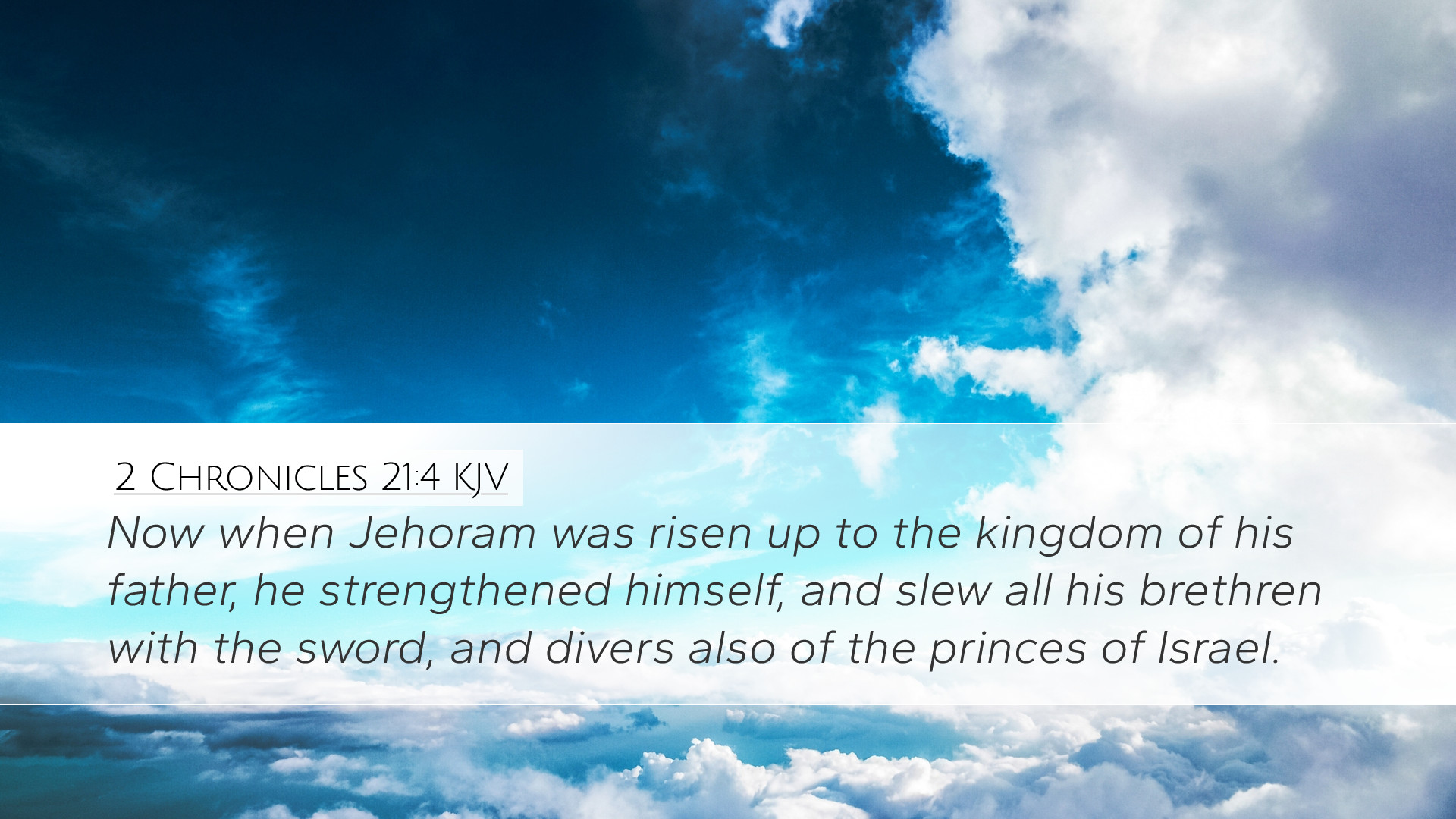Commentary on 2 Chronicles 21:4
Verse: "Now when Jehoram was risen up to the kingdom of his father, he strengthened himself, and slew all his brethren with the sword, and divers also of the princes of Israel."
Introduction
This verse introduces the reign of King Jehoram of Judah, highlighting a critical moment characterized by violence and political intrigue. The commentary that follows aims to dissect the implications of Jehoram's actions and their consequences for Judah.
Historical Context
Jehoram ascended to the throne following the death of his father, King Jehoshaphat. Historical context is vital to understanding Jehoram's reign, as Judah had experienced a relatively peaceful time under Jehoshaphat, but now faced the dangers of rising internal and external threats.
Commentary Insights
-
Matthew Henry's Commentary
Matthew Henry interprets Jehoram's ascension as a tragic shift from his father’s godly influence. Jehoram's immediate resort to violence symbolizes a departure from the covenant commitment and moral standards upheld by Jehoshaphat. He emphasizes that Jehoram's actions were not merely political maneuvers but a diabolical act of fratricide that set a tone of tyranny for his reign. This brutality was driven by a desire for absolute power, reflecting the darker aspects of human nature.
-
Albert Barnes' Commentary
Albert Barnes highlights the significant details of Jehoram's actions against his siblings. According to Barnes, Jehoram’s decision to slay his brothers was not customary; it was a savage act that showed his fear of potential rivals. Barnes also notes Christ's genealogy in Matthew 1, indicating that Jehoram was an ancestor of Christ—pointing to the grace and mercy of God in the lineage despite the king's evil. He states that such ruthless behavior inevitably leads to divine judgment.
-
Adam Clarke's Commentary
Adam Clarke expands on the spiritual implications of Jehoram's tyranny. He argues that Jehoram’s actions reflect the corrupting influence of idolatry, as evidenced by his marriage to Ahab's daughter, Athaliah, who would later play a pivotal role in the continued apostasy of Judah. Clarke underscores that Jehoram’s violent actions must be seen not just in isolation but as part of a larger narrative of wickedness that draws the nation away from loyalty to Yahweh.
Theological Reflection
The brutal actions of Jehoram provide valuable insights into the dynamics of power and morality in leadership. The text poses profound questions regarding the price of ambition and the cost of forsaking God’s laws. It serves as a reminder of the consequences of sin not only for the individual but also for the community.
Lessons for Leaders
- The Danger of Power: Jehoram's rise to power illustrates how the pursuit of authority without accountability can lead to moral decay. Leaders are reminded of their responsibility to uphold justice and righteousness.
- The Importance of a Godly Heritage: This passage emphasizes the significance of a righteous upbringing and the influence of parental guidance. Leaders should strive to be examples of faithfulness.
- The Reality of Consequences: The violent methods employed by Jehoram had dire repercussions for his reign and ultimately for Judah. It serves as a warning regarding the inevitable consequences of leading astray.
The Outcome of Jehoram's Reign
Ultimately, Jehoram’s reign ended in disaster. His violent rise led to downfall, rebellion, and suffering not only for him but for the entire kingdom. This historical example serves as a cautionary tale that resonates throughout biblical history and provides timeless insights for modern leaders.
Conclusion
2 Chronicles 21:4 is a pivotal verse that marks the beginning of a dark chapter in Judah’s history under Jehoram. Through the insights gleaned from Matthew Henry, Albert Barnes, and Adam Clarke, we discern the spiritual, moral, and societal ramifications of his actions. As we reflect on this passage, we are challenged to consider the heavy burden leaders bear, the importance of faithfulness, and the enduring justice of God in the face of human transgression.


